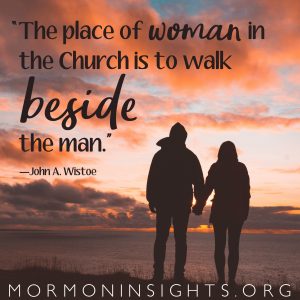Are the principles of feminism and the doctrines of the Church incongruous, or are they in harmony? The answer isn’t as simple as you might think.
Feminism—a word charged with a plethora of connotations, both good and bad. We hear about feminists in the news and feminist political agendas and feminist literary criticism. But what is feminism at its core, and does its philosophy overlap with Church doctrine? Or are we to eschew it as a veritable “F” word?
Although feminism has been defined in many ways, for the purposes of this article let’s use a basic working definition: feminism is the promotion of equality between men and women. Based on that definition, this philosophy is not nearly as controversial or dissonant with the gospel as some people make it out to be. In fact, President Boyd K. Packer suggests in his talk “A Tribute to Women” that “men and women have complementary, not competing, responsibilities. There is difference but not inequity.”
Church leaders have made only a few direct references to feminism—probably at least in part due to its hazy definition—but in a 1971 New Era article titled “Women’s Affairs,” Shauna-Lisa Shields explores how various principles accepted by some feminists do or do not mesh with gospel teachings. Even though the article was published a few decades ago, some of the principles the article presents can provide a relevant framework for constructing a more complete understanding of how feminism and the Church relate.
One issue is abortion. Some feminists, though not all, support the practice. On the other hand, Church leaders have spoken very clearly about this issue. LDS.org states that “elective abortion for personal or social convenience is contrary to the will and the commandments of God. Church members who submit to, perform, encourage, pay for, or arrange for such abortions may lose their membership in the Church.” And in the talk “Abortion: An Assault on the Defenseless,” President Russell M. Nelson affirms that “a woman’s choice for her own body does not include the right to deprive her baby of life—and a lifetime of choices that her child would make.”
Perhaps an even stickier issue is the concept of women having inherently separate roles from men. The Church stresses that women’s primary responsibilities include being mothers and homemakers. However, in the talk “The Moral Force of Women,” Elder D. Todd Christofferson states that some feminists condemn motherhood and homemaking as a career and aim to “erase all differences between the masculine and the feminine.” As a response to this mentality, Elder Christofferson asserts that “we do not diminish the value of what women or men achieve in any worthy endeavor or career . . . but we still recognize there is not a higher good than motherhood and fatherhood in marriage.”
The principles of Mormonism and feminism both support equality within marriage and within the Church. Feminists would agree with Shields’s New Era article that “no woman need be treated as a ‘thing’ nor need she lack individuality” and that “simply because men and women are biologically and psychologically different, that does not mean that one is superior to the other.” In the address “The Role of Righteous Women,” President Spencer W. Kimball quotes Elder John A. Widtsoe as saying that “the place of woman in the Church is to walk beside the man, not in front of him nor behind him.” As disciples of Christ, we are expected to value each person’s individual worth and important contributions, for “the worth of souls is great in the sight of God” (Doctrine and Covenants 18:10). And as “The Family: A Proclamation to the World” states, “Fathers and mothers are obligated to help one another as equal partners.”
There is no easy answer to the question of whether feminism and Mormonism are compatible, because it comes down to questions of individual principles, issues, and interpretations. However, President Kimball encourages us not to judge those whose lifestyles don’t seem to fit the mold of the “traditional” LDS woman. He recognizes that some wives must work to support their families, and “the talents God has given you and blessed you with can often be put to effective use in additional use to mankind.” The goal we should all have, he says, is to pursue achievements “which will fit you for eternity as well as for full service in mortality.” In finding that balance between mortal and eternal achievements, we can profit from the goodness found in both feminist philosophies and Mormon doctrines.
Explore the rest of Elder D. Todd Christofferson’s description of the threats to women’s powerful influence in “The Moral Force of Women.” Read Shauna-Lisa Shields’s full article, “Women’s Affairs,” to learn about how gospel principles and feminist ideals coincide and diverge.
Source: LDS.org
—Alex Hugie, Mormon Insights
feature image by pixabay
Find more insights
Elder Boyd K. Packer gives poignant homage to women in his talk “A Tribute to Women.”
Hear President Spencer W. Kimball’s thoughts on women’s place in the world in “The Role of Righteous Women.”
Want to know more about the Church’s position on abortion? Take a look at President Russell M. Nelson’s powerful discourse “Abortion: An Assault on the Defenseless.”



